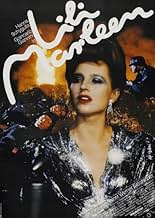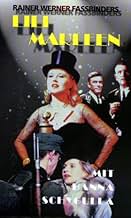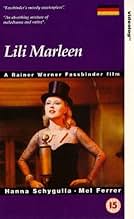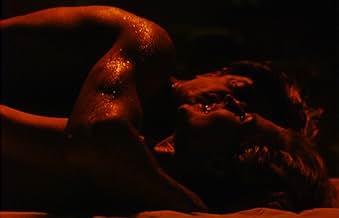NOTE IMDb
7,1/10
4,5 k
MA NOTE
En 1938, un chanteur allemand tombe amoureux d'un compositeur juif de Zurich, qui aide les Juifs à fuir l'Allemagne nazie. Elle est renvoyée en Allemagne. Sa chanson "Lili Marleen" devient u... Tout lireEn 1938, un chanteur allemand tombe amoureux d'un compositeur juif de Zurich, qui aide les Juifs à fuir l'Allemagne nazie. Elle est renvoyée en Allemagne. Sa chanson "Lili Marleen" devient un hit auprès des soldats et du top nazi.En 1938, un chanteur allemand tombe amoureux d'un compositeur juif de Zurich, qui aide les Juifs à fuir l'Allemagne nazie. Elle est renvoyée en Allemagne. Sa chanson "Lili Marleen" devient un hit auprès des soldats et du top nazi.
- Réalisation
- Scénario
- Casting principal
- Récompenses
- 1 victoire et 4 nominations au total
Karl-Heinz von Hassel
- Henkel
- (as Karl Heinz von Hassel)
Raúl Gimenez
- Blonsky
- (as Raul Giminez)
Avis à la une
I am terribly sorry, I know that Faßbinder still is called one of the greatest directors in post-war Germany and that most of his films are considered "master-pieces", but when I see "Lili Marleen" today, in 2004, I wonder what everyone is up and away about this movie! The acting is simply terrible - Hanna Schygulla is all the smiling like an idiot! -, the changings between Nazi-glamour and battlefields are ridiculous, the whole film looks as if it was made within two days in an attic. Probably it was exactly that way and many people seem to take this for "real art", but for me this movie is simply bad & cheap. Compare this to Viscontis "La Caduta degli Dei" and tell me again that "Lili Marleen" is a good movie...
The story of a song in Nazi Germany.. a fiction piece masterly created by Fassbinder. Whilst a stimulating watch, it feels editing could have been tighter at times.
Afterwards you can not get the song 'Lili Marleen' out of y head.
Best to watch the German version instead of the dubbed English one.
It is based on the song Lili Marleen, sung by Lale Andersen, and her romance with Rolf Liebermann in the movie Willie and Robert. The film tried to be very impartial in relation to Lale and Nazism, although she helped discreetly, and for Robert, the Allies, however in the end, she ended up surrendering to Nazism, to continue singing, to leave the Black List, had to change her famous song with a military air, she didn't marry Rolf, but kept an eternal friendship, could have done better...
10hasosch
Many critics have felt offended that R.W. Fassbinder has portrayed both protagonist Wilkie and the Nazis in this movie in a human-like manner. Connoisseurs of other Fassbinder films, however, will realize that "Lili Marleen" (1981) belongs to Fassbinder's "women movies" like "The Marriage of Maria Braun" (1979) and "Lola" (1981). Fassbinder was convinced that "stories can be told much better with women than with men", because, according to Fassbinder, while men usually fulfill their determined roles in society, "women are capable of thinking in a dialectic manner". Dialectics, however, means that there is not only a thesis and its antithesis like usually in our black-and-white world, but a synthesis where the oppositions coincide. Moreover, dialectic means that because of the third instance of synthesis the absolute opposition of the difference between thesis and antithesis is abolished. Concretely speaking: Starting from a dialect point of view and portraying the fascist state, the underground fighters must necessarily use the basic means like the rulers do, and between offenders and victims there is thus a chiastic relation, so that every offender is also victim and every victim is also offender. Fassbinder has illustrated this abstract scheme, that transcends classical logic, in his play "The City, the Garbage and the Death" (1975) which was filmed by Daniel Schmid under the title "Shadow of Angels" (1976).
Therefore, approaching an a priori controversial topic like Nazi Germany, in a dialectic manner, the depiction of this time in the form of a movie gets even more controversial, especially for people who cannot or do not want to see that our recognition of the world is by far not exhausted with a primitive light-switch schema, but needs the third instance of synthesis as controlling instance of its opposite members thesis and antithesis. The mutual relationship between offenders and victims has to scrutinized, since it is simply not true that the offenders are the bad ones and the victims the good ones. In a synthetic viewpoint, the bad ones participate on the goodness as the good ones participate on the badness. They are mutually related. In a world-view based on classical logic, a relation between good and bad cannot even been established, and in an ethics based on this insufficient system of logic, the bad conscience of the survivors of Nazi Germany, feeling (illogically enough) responsible for the deeds of their ancestors, exclude the possibility of a relationship between the two extremes and thus a synthesis in the form a new evaluation based on this relationship as well. From Fassbinder's dialectic viewpoint, it follows that neither Lili Marleen nor Lola nor Maria Braun can be condemned for their "misuse" of the ruling system for their private purposes, because they don't misuse them, they just use them. In the opposite, since victims must repeat the actions of the offenders as the offenders must repeat the actions of the victims, because "good" and "bad" are no longer simple mirror images of one another like in two-valued logic, their strategies are legitimated by the chiastic structure of a logic that describes our world, that is not black and white at all, much better than a black-and-white logic.
Therefore, approaching an a priori controversial topic like Nazi Germany, in a dialectic manner, the depiction of this time in the form of a movie gets even more controversial, especially for people who cannot or do not want to see that our recognition of the world is by far not exhausted with a primitive light-switch schema, but needs the third instance of synthesis as controlling instance of its opposite members thesis and antithesis. The mutual relationship between offenders and victims has to scrutinized, since it is simply not true that the offenders are the bad ones and the victims the good ones. In a synthetic viewpoint, the bad ones participate on the goodness as the good ones participate on the badness. They are mutually related. In a world-view based on classical logic, a relation between good and bad cannot even been established, and in an ethics based on this insufficient system of logic, the bad conscience of the survivors of Nazi Germany, feeling (illogically enough) responsible for the deeds of their ancestors, exclude the possibility of a relationship between the two extremes and thus a synthesis in the form a new evaluation based on this relationship as well. From Fassbinder's dialectic viewpoint, it follows that neither Lili Marleen nor Lola nor Maria Braun can be condemned for their "misuse" of the ruling system for their private purposes, because they don't misuse them, they just use them. In the opposite, since victims must repeat the actions of the offenders as the offenders must repeat the actions of the victims, because "good" and "bad" are no longer simple mirror images of one another like in two-valued logic, their strategies are legitimated by the chiastic structure of a logic that describes our world, that is not black and white at all, much better than a black-and-white logic.
Story of a song. And what song! In fact, the creation of Hans Leip and Norbert Schultze is the only character, a spell who creates existences, loves, tragedies with a sarcastic indifference. It is an obsessive music, soul of a ambiguous time of dreams and ideas intoxication, with old words and cruels ambitions.
Certainly, it is a Fassbinder's lesson about values and lies, about rules of war and feelings, about small victims and sacrifice.
Hanna Schygulla is gorgeous in a character's skin different of Lale Anderson or Marlene Dietrich but with the same art to describe the atmosphere of extincted space. In some moments I saw in parts of film elements of "Cabaret" Nazi song or "Satyricon" dances. It is normal: interpretation of song is not only piece of a show but rule of life. "Lili Marleen" is not the old "Das Lied eines Jungen Soldaten auf der Wacht" but hard of an universe, hypocrite, coward, frail.
The final meeting between Willie and Robert is only seal of ordinary tragedy. To late, to far.
Certainly, it is a Fassbinder's lesson about values and lies, about rules of war and feelings, about small victims and sacrifice.
Hanna Schygulla is gorgeous in a character's skin different of Lale Anderson or Marlene Dietrich but with the same art to describe the atmosphere of extincted space. In some moments I saw in parts of film elements of "Cabaret" Nazi song or "Satyricon" dances. It is normal: interpretation of song is not only piece of a show but rule of life. "Lili Marleen" is not the old "Das Lied eines Jungen Soldaten auf der Wacht" but hard of an universe, hypocrite, coward, frail.
The final meeting between Willie and Robert is only seal of ordinary tragedy. To late, to far.
Le saviez-vous
- AnecdotesShot in English for American distribution; later dubbed in German
- GaffesKaufmann, the German officer who arrests Robert on the train, wears the uniform of an SS-Gruppenfuhrer (General) - it is highly unlikely that an SS General of such rank would be checking identity papers at random on a train.
- Bandes originalesLili Marleen
(German Version)
(based on a poem from the 1915 book "Die kleine Hafenorgel" by Hans Leip)
Music By Norbert Schultze,
Vocals Hanna Schygulla
(p) 1981 Schlicht Musikverlag, Phonogram, GmbH, DRG Records, Inc., Philips
© Metropolis Records
Published By Brampton Music Ltd., Chappell Music Ltd., Peter Maurice Music,
EMI Music
Meilleurs choix
Connectez-vous pour évaluer et suivre la liste de favoris afin de recevoir des recommandations personnalisées
- How long is Lili Marleen?Alimenté par Alexa
Détails
- Date de sortie
- Pays d’origine
- Langues
- Aussi connu sous le nom de
- La vida íntima de Lili Marleen
- Lieux de tournage
- Sociétés de production
- Voir plus de crédits d'entreprise sur IMDbPro
Box-office
- Budget
- 10 500 000 DEM (estimé)
- Montant brut aux États-Unis et au Canada
- 8 144 $US
- Week-end de sortie aux États-Unis et au Canada
- 11 623 $US
- 16 févr. 2003
- Montant brut mondial
- 8 148 $US
- Durée2 heures
- Mixage
- Rapport de forme
- 1.66 : 1
Contribuer à cette page
Suggérer une modification ou ajouter du contenu manquant

Lacune principale
By what name was Lili Marleen (1981) officially released in Canada in English?
Répondre

































